

PopEntertainment.com >
Feature Interviews - Actresses
>
Feature Interviews A to E
> Alice Braga
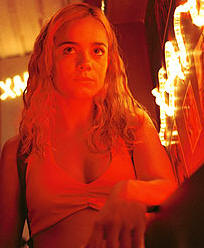
ALICE BRAGA
THE BRAZILIAN ACTRESS RAISES
THE STAKES
by Brad Balfour
Copyright ©2006 PopEntertainment.com. All rights reserved.
Posted:
June 20, 2006.
Maybe Alice Braga
isn't the first name to come up when thinking about hot Brazilian
actresses, but after seeing her second feature Lower City—where
she's plays an aimless yet sensual stripper/prostitute who falls for
lifelong friends Deco and Naldinho (they own a small cargo boat in Bahia)
and nearly shatters their deep friendship—it's hard to get her writhing
body out of mind.
Yes, this niece of
veteran actress Sonia Braga and cast member of director Fernando Meirelles'
award-winning City of God, has now given an understated yet
striking performance that merits scrutiny in a film with a familiar yet
classic scenario. Born in Sao Paulo, she started acting at 18, has done a
TV series and now two films with novice feature directors, which had
veteran director Walter Salles as producer. She was also seen in Eric
Eason's sophomore feature that debuted at the Tribeca Film Fest 2006,
Journey to the End of the Night. So with such a start underway, Braga
plans to use the English she has learned for more than just interviews
with American journalists.
Where did you learn
to speak English so well?
I learned in São
Paulo. Thank you for saying that I speak well because I'm very insecure
about it. I say, "Oh my English! I don't speak well!"
Did you find this
role a tough or an easy one to understand?
Karinna? When I read
the script, I knew that she was a challenge to go through. The more that I
read, the more I wanted to do it. I was questioning myself—am I capable?
When I sat down with Sérgio, we spoke a lot. I think it was a great, great
character to do because there were so many doors so that you could throw
yourself into it. To open your heart. I think it's the kind of character
that I wanted to portray.
She was both hard
and soft. You had to make that an interesting battle. What did you think
about this character? What made her and what motivated her? Did you know
people in her situation?
When I spoke to
Lower City
director Sérgio [Machado] for the first time, he told me a lot about her.
But the most important thing that we did was work with Maria Fatima
Toledo, the acting coach. She had a specific method, so we started to work
with getting into the characters and letting our souls connect with the
story. I think the most challenging thing for me was to portray her
passion. I had to show the two guys—Deco and Naldinho—with the same
intensity and the same passion. Not showing more to one than the other one
because it's all about the love they have for each other. It's
equilateral.
What about her being
a prostitute while also trying to find love or a sexual relationship that
wasn't only about money?
I never thought
about that. Sérgio asked me to not think about it. He wanted to portray
the love between them. He didn't want to portray a social problem or
social issue. It's a film about intense love and friendship, about
jealousy, about lust—everything that human beings go through in life. A
young girl that is alone in the world and she finds these two guys that
she falls in love with.
 Were
you a little bit older than the character?
Were
you a little bit older than the character?
I was the same age.
When I was doing the film, I was 20, just like Karinna. I turned 21 on the
set.
Have you met any
prostitutes? Sometimes there are people you wouldn't even think were doing
this but are.
We were in Bahia,
and we went to go meet them and interview or try to hang out, to be
together. We didn't want to fall into any stereotype. We wanted to create
a Karinna ourselves, to build someone who was genuine. We wanted to look
from the inside, not the outside, because when you look from the outside,
you wind up making judgments or stereotypes. I just went to the places to
feel the energy, to see the environment. To know how it was, and how it
worked with the relationship with the client. But also to observe the
girls and find out how they feel.
When you saw
Lower City, did you see yourself as sexy?
Yeah! I think I was
really sensual, but not in a vulgar way. Just naturally sensual. She moves
in a sensual way. In Bahia, they have the heat in their hearts. They have
the passion.
What was the
toughest challenge for you in this movie?
It was to portray
the same intensity for each character, the love that she had for each
character. She loves Deco [Lazaro Ramos] at the same time that she loves
Naldinho [Wagner Moura]. To portray that is really hard because you can't
give one a look more than the other one. It needs to be an equilateral
triangle. She needs to portray the same love for the two of them.
And the hardest
scene?
The striptease. Not
because of the nudity, not because of the sensuality of the scene. That
wasn't the main problem. For me, the challenge was to show her love in
that scene to the two of them with the look and the seduction. To have the
same intensity for each of them. Not just for one or the other one.
Did you look at
other movies that were about threesomes—like Francois Truffaut's
Jules and Jim?
Yeah! Jules and
Jim was an influence for Sérgio.
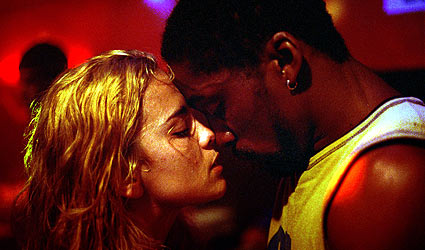 Did
you look at any other movies that dealt with this subject?
Did
you look at any other movies that dealt with this subject?
Not so much. We
wanted to play our own story. Of course, I've seen Jules and Jim,
[Alfonso Cuaron's] Y tu mamá también, and films that show that
[situation] not to use it in our film, but just for curiosity. I love
Jules and Jim because it's a great film. Y tu mamá también also
because it's so intense and sensual without being vulgar. It's like in
Lower City.
Do you hope to work
with Wagner Moura and Lazaro Ramos again?
I really want to
work with them again because I learned so much. They're such good actors
and passionate about acting that it was really fun.
They're two of the
most up and coming actors from Brazil. They're both reflect the image of
the modern Brazilian actor.
Yeah. They're
really, really good. They came from theater. Those kinds of actors are
passionate about what they do. It's great because they bring so many great
things to this new generation of actor that is coming out of Brazil right
now. I'm glad that I could be with them and grab that energy.
What was the most
distinct difference between Sérgio and Fernando as directors?
Fernando has done so
many commercials that he is fast. He knows what he wants. He is the kind
of director that goes pop-pop-pop-pop-pop. Okay. Pop-pop-pop-pop-pop.
Okay. One after the other. Sérgio is more intense. Lower City was a
specific script that he wrote, and he was very passionate about it. It was
almost like a play working with Sérgio. Fernando was as passionate, but in
a different way. In a different language.
I think he also more
involved with the visual and technical style, whereas Sérgio is more
grounded in the story.
Exactly.
That made different
demands on you, I would imagine.
In City of
God,
it was such a small part that I couldn't develop a strong sense with this
small character.
Lower City
was the lead, and so was a strong character.
How did Brazil
receive this movie?
They liked it a lot.
They said it was really intense, but they completely understood the
passion and the love between these three. The intensity of their passion.
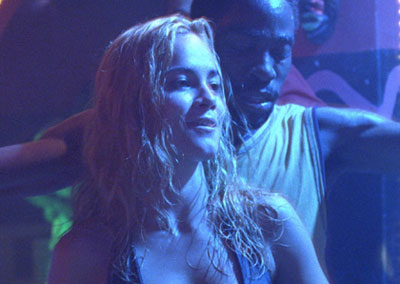 Do
you think the three stay together?
Do
you think the three stay together?
I don't know. I
think the main thing is about the moment. The moment is important. I don't
know if they stay together or not, but they just live the best they can
for that moment. But I think they do because they love each other so much
that it's hard to let it go.
How much have you
grown as a person from when you did
City of God?
I think I changed a
lot. I was eighteen when I did City of
God.
I was in high school. Now I'm 23, and a lot of things have happened. I did
two years of university. Then I went out to New York for a short-term
course at NYU. Then I came back and practiced my English. In my personal
life, things happened. I think I'm a bit more mature. I'm not completely
different because I'm still young and have a lot to learn. I think
portraying Karinna has brought me a lot as an actress. And even as a human
being.
Having experienced
the lower depths of society in Brazil, what have you learned about that
society? You come from a fairly middle class background—this was a strange
way to become exposed to it so what are your insights and observations?
And do you think the situation can ever be changed?
I hope it improves.
I think we need to keep our eyes open. We have a huge inequality that is
really sad. We have a very strong social problem there. I had to portray
someone that cannot make plans because she can never know what's going to
happen tomorrow and live the moment like it was the last one. You never
know what's going to happen. To live between life and death, you end up
learning for sure. We should keep and eye on it and try to change it
because it's really horrible.
We have a huge
problem in Brazil with sexual tourism. They sell fifteen year old girls to
tourists for a cheap price. This is really sad. We have drug dealers, the
problems in Rio, hungry people. We need to keep and eye open and know that
it is our problem. Everyone needs to help. It's not the government's
problem. It's our problem. We need to try to do our best to help.
What made you decide
to go to school in New York?
I still want to
study because everything happened so fast. I wanted to understand more
about acting, to have more "luggage" to develop a character or throw
myself into a different project. I went to University because I was very
curious about theater. I hadn't done theater, at least not professionally.
Just in high school. My mother said to me that it's really important to
keep studying because actors portray lives. We need to know how to get in
touch with the lives. Not just observing, but developing studies about it.
I just got the
opportunity to go to University, and after that to go to New York for
three months. When I got "Lower City," I ended up stopping University for
a while. I wanted to go back, but I started to do films and films and
films. And I couldn't go back. Now the next step is to maybe go back to
University, or at least take as many courses I can to keep going. I
haven't studied much, so I feel that desire to keep studying.
You did that
three-month course they do at NYU. Did you make a short film?
I did it for acting,
not for cinema. But I'm looking forward to doing cinema, too. Do you have
any advice?
If you can get away
from the acting and come to New York, it can make you a better actor.
I really want to
come back to New York. I've been meeting a lot of people from Columbia
University. I want to story acting more and do a film course.
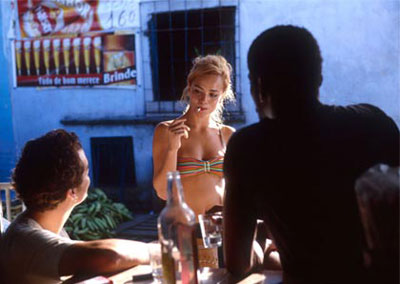 When
you were in New York, did you get to make any kind of films?
When
you were in New York, did you get to make any kind of films?
No, I didn't. But
I'm dying to make a short film with this girl from Columbia University who
I've been talking to. That's something that I want to do too, short films.
I have two friends that are really good directors. They invited me for a
short film, and I'm dying to go do it with them. In New York, this girl
spoke to me. I want to sit down and talk to her about it.
You finished the
movie. What is it exactly that you will do next?
I'll go back to
Brazil. There's a film that's going to shoot there. I'm reading a few
scripts. But the short film—I'm definitely going to do it.
Do you feel you can
break out beyond being seen as just a "Brazilian" actress?
I want as an actress
to be able to portray as many different characters as I can—to be open to
different things and not be stuck in one single thing. I don't know how
the cinema is in New York. I'm still getting in touch with it. I haven't
started doing films there, and I don't know if it's going to happen or
not. I hope I can do more and more Latin films. But I want to open doors,
study as much as I can to be an actor. To keep going, because that's what
I want to do.
Did you get the
opportunity to work with Hector Babenco when you did
Carandiru—the TV series based on his film?
I didn't work with
him. I did Carandiru for TV, but Bebenco was the supervisor. He
invited a few other directors to make short films to air on television.
The director that I worked with was Walter Carvalho. He was a
cinematographer who did Central Station with Walter. He did
Behind the Sun. He did the Carandiru film. Walter directed this
short film that I did. It was funny. My first TV appearance in Brazil was
through cinema because we shot on film. The director was from film, as was
the crew. They were all from cinema. It was a great thing to be involved
in.
Has Sonia Braga,
your aunt, seen the movie?
No. When it was
released in Brazil, she was here, and now that she's there, it's releasing
here. It's coming out on DVD, so she'll see it this month. I hope so. I'm
curious.
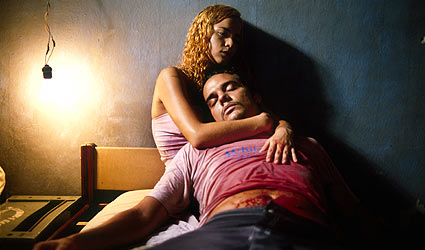 I
wondered whether you would be excited to show it to her or worried to show
it to her.
I
wondered whether you would be excited to show it to her or worried to show
it to her.
Excited. I hope that
they like it. My mom and dad love it because they thought I was really
into it. I think she would be proud of me. I hope so. Who knows?
Are you living in
São Paulo?
Yes. I live in São
Paulo. I travel for films and go around, but my home is there.
Do you see yourself
working behind the camera? Is that an interest as well?
I don't know. I love
acting, and that's what I want to do. But I started to visit sets with my
mom when I was five. I always loved the energy of being in cinema—the
camera guy, the director, the producer. I love the environment. Right now,
my focus is acting. I believe that's what I want to do for the rest of my
life. But to stay on set, I'll do whatever I can. A friend of mine invited
me to help with his next short film. I would love to be on the set and do
whatever I can to help him for the pleasure of being on the set.
What's coming up
next?
I have two other
films to be released. One is Sólo Dios Sabe, a co-production in
Brazil, and the other one is Journey to the End of the Night, an
American production but shot in São Paulo.
I did another
low-budget film in São Paulo. It's an independent project. I'm not sure
when it's coming out. They're in post-production now. They're trying to
get investments from Spain or some other country. I'm not sure. I'm
reading some scripts. I really want to do a play, to get a chance to do
theater. I'm looking forward to going to New York to keep studying, to
keep learning and throwing myself into the characters. Now having a few
opportunities at work, I want to use them to improve.
If you do come back
to New York, do you have any directors in mind that you want to let know
you're here?
I don't know. That's
a good question. Someone specifically? I can't tell. But I can tell that I
would love to work with as an actor? John Turturro. He's in New York,
right? He lives in Brooklyn. Spike Lee. He's a New Yorker. Woody Allen.
This is such a great town. I can spend a half an hour right now talking
about people who live there.
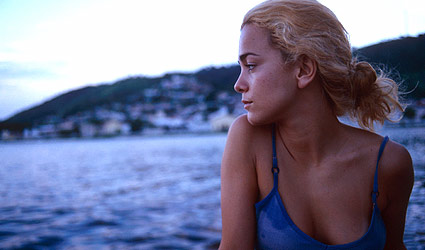 Who
was the first one?
Who
was the first one?
John Turturro. He
was the first one that came up in my mind—not just him. I saw again that
Coen Brothers film with him a few days ago, and he really stole my heart,
my mind when I saw it again. He's an amazing actor. He was the first one
that came up. He's a great actor, isn't he?
He's great. I didn't
even recognize him in a recent film I saw. He was sufficiently different.
The real challenge is for people not to recognize you in the movie when
you're playing the character.
Exactly. That's what
I love about this profession. I hope I can do that.
Are there any
American actors that you're dying to work with?
It comes up. John
Turturro is in my mind today. I would love to work with Luis Tosar. He's a
Spanish actor. I love his work. He's a great, great actor. But Turturro is
the guy from America. He's in my head right now. I think it's because I
saw the movie two days ago, and he's in my heart.
Are you ready to do
a movie in English? I think your English is quite good.
Definitely. You guys
have such a strong industry in America. You can open so many doors doing
films here that it could be a great opportunity. At the same time, I'm so
interested in Latin films, in Europe and Brazil, Argentina, Mexico… That
could also open doors. If in the U.S. a door would open, I'd love to get
in but not just here. I want to go anywhere that opens the door for
cinema. That's my passion.
Do you think that
you're going to be the next big international star to come out of Brazil?
I don't know if it's
true or not, but I get butterflies. If people think that, then I
appreciate it because it means that I did a good job in the film. You
never know. It's such a crazy business. There are so many good actors in
the world. You never can tell if this is the one, or if it's the other
one.